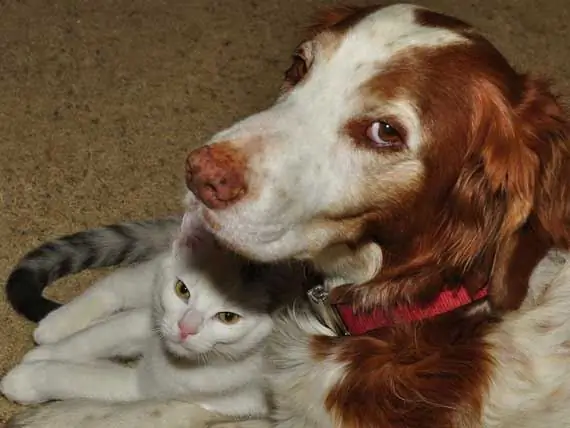
- Autore Daisy Haig haig@petsoundness.com.
- Public 2023-12-17 03:10.
- Ultima modifica 2025-01-24 12:38.
Quando acquisti un cucciolo, acquisti un "certificato sanitario" per accompagnarlo. Come ogni consumatore dalla mentalità letterale, presumi che un certificato con questo titolo significhi che è stata esaminata da un veterinario e ha ricevuto un timbro di approvazione nel dipartimento della salute.
Indovina ancora.
La scorsa settimana ho inviato una raffica di e-mail dalla mia lista FVMA (Florida Veterinary Medical Association). L'argomento era la diffusa confusione professionale sugli OCVI (Certificato ufficiale di ispezione veterinaria per la vendita intrastatale di un cane o di un gatto). L'OCVI, un modulo che va sotto il nome comune di "certificato sanitario", è uno di quei documenti che la maggior parte degli stati richiede di essere completato da un veterinario autorizzato prima che un animale possa essere venduto o trasportato attraverso i confini statali.
the point of this document? to ensure animals are vaccinated and free of parasites or other infectious diseases before sale, not (contrary to popular opinion, including mine before last week) to certify the animal’s complete health.
(at least that’s how it stands in the great state of florida, given the confusion that reigns over what these documents actually mean and how ocvis are to be filled out.)
i wasn’t sure i believed this. after all, it has always seemed to me that the purpose of this form was to ensure that unscrupulous breeders and pet shops couldn’t pass on clearly defective “merchandise.” even if you could care less about animal health and welfare, it makes sense that a health certificate should certify health at the time the animal is examined-in the interest of consumer protection, at the very least.
the emails on this thread proved otherwise. indeed, several veterinarians spoke out against the ocvi as a proof of health, referencing the need to avoid legal liability in the event that a purchased pet prove chronically ill or congenitally flawed.
silly me, i thought that was the point. since we get paid to sign these documents i figured the financial remuneration was in exchange for our expertise-that is, beyond pushing a few shots, checking for kennel cough and expertly scooping stool from a rectum for analysis.
wrong!
confused, i researched this issue. and here’s what i found:
apparently, the problem of “health certification” and veterinarian resistance to the issue stems from a drive to make vets liable for congenital illnesses that manifest up to a year after purchase when they sign ocvis.
example: a pup that was normal when a vet examined him at 8 weeks. six months later he’s diagnosed with hip dysplasia. and guess what? according to this proposed interpretation of ocvis the vet is potentially liable for his treatment.
given the choice between a document that makes me liable for what i can attest to and one that requires a crystal ball for the kind of accuracy i’m willing to sign my name to, i guess i’ll elect the former any day of the week. can’t blame my fvma colleagues on that score.
but why the either/or? why can’t i simply be liable for all the problems any reasonable vet should have seen at the time the exam?
honking heart murmurs, undescended testicles, certain obvious knee and hip diseases…
don’t these congenital niceties deserve to be included among the “health” issues we need to vet as vets?
i see pet shop pups and other shipped pets with two day-old ocvis bearing obvious congenital illnesses any third-year vet student could diagnose. clearly that’s wrong. someone needs to be accountable when these conditions are given a pass. but legally, all’s fair and square if a health certificate only deals in infectious diseases. after all, most states also have pet lemon laws making it “easy” to return a defective afflicted animal within a certain period of time. no harm no foul, right?
wrong again. no animal should be sold without a veterinarian’s stamp of approval within ten days of the sale. and that should mean that the animal appears to be completely healthy at the time of the exam. any congenital abnormalities should be written on the form. anything less means no sale. no way.
responsible breeders wouldn’t dream of doing otherwise. pet shops, on the other hand, exploit all the angles. they work with vets who know the loopholes as well as they do. they even try to get prospective owners to sign lemon law waivers, passing them off easily in the pile of paperwork that attends the point of sale.
as it stands, what you consider a health certificate for that puppy in the window may mean nothing except that said pup was vaccinated, no upper respiratory symptoms were noted and that no parasites were observed on the day the pup was presented to the vet for examination. but if vets are liable for only those meager, easily refutable functions, what does that say about the entire “health certification” process?
as my former ignorance of the law clearly implies, not all vets even know what they’re signing when they complete these forms. but you can bet the ones who work for the pet shops do.
check your state’s regulations to determine what your health certificates mean. even if you’ll never purchase a pet in your lifetime, your moral compass should drive you to care about what happens to thousands of animals every day in your state/province/country.
no-health health certificates? they simply ensure that poor quality purveyors of congenitally flawed animal flesh can continue to breed animals irresponsibly, unfairly and cruelly. and that’s gotta change.
Consigliato:
La California Vieta La Vendita Di Animali Non Destinati Al Salvataggio Nei Negozi Di Animali

In una decisione storica, il governatore della California Jerry Brown ha firmato un disegno di legge che impedirà la vendita di cani, gatti e conigli allevati commercialmente nei negozi di animali in tutto lo stato
Quello Che Pensi Di Sapere Sui Gatti Potrebbe Non Essere Vero

Con i gatti che sono le creature misteriose che sono, sono sorti numerosi miti intorno a loro. Molti di questi miti sono lungi dall'essere veri e alcuni rasentano addirittura l'essere ridicoli; ma persistono, tuttavia. I gatti atterrano sempre in piedi quando cadono
Gli Animali In Viaggio Hanno Spesso Bisogno Di Certificati Sanitari

Sapevi che se attraversi un confine di stato con il tuo animale domestico, dovresti portare con te un certificato di ispezione veterinaria valido? È vero. Ripensa all'ultima volta che hai visitato la zia Mable in Ohio o hai fatto un'escursione in Virginia. Stavi infrangendo la legge se portavi con te Fluffy o Fido senza un certificato sanitario
Quello Che Non Sai Sui Funghi Può Uccidere Il Tuo Cane

In teoria, i funghi del supermercato dovrebbero andare bene per i cani, ma potresti non voler scherzare con quelli dopo aver letto questo
Non "tasare" Il Cane Non Importa Quello Che Dice Taser Inc

Non fallisce mai. Scrivo una colonna che menziona un prodotto, non importa quanto innocentemente, e le multinazionali inevitabilmente vengono a prendermi. Questa volta mi è capitato di affrontare l'ovvio: portare una pistola stordente Taser per prevenire attacchi di cani nelle impostazioni del parco dei cuccioli è una cattiva idea. S
